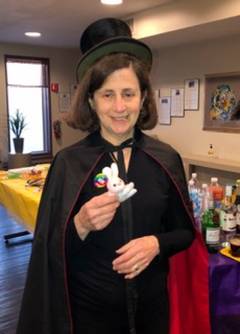Va-y'hi 2018: Figure and Background
12/26/2018 06:59:56 PM
Dec26
| Author | |
| Date Added | |
| Automatically create summary | |
| Summary |
What do you see in this image? A vase, or two faces looking at each other? This famous optical illusion was developed by the Danish-Jewish psychologist Edgar Rubin, as part of his work on what he called the figure-ground distinction. Normally, when we look at something, our brains automatically differentiate what is the main figure and what is in the background. So, for example, when we read printed words on a page, our brains focus on the words and not the white space around them.
The problem is when the distinction becomes ambiguous, as in this image. Our brain has trouble determining which is the figure and which is the background. It has to discard some information and privilege other information, to determine what it is looking at. That is why some people at first glance see the vase and others the faces. If you focus, you can even switch back and forth between seeing one and the other.
So even when it comes to very basic perception, how we literally see and make sense of the world around us, we make conscious and unconscious choices about what to focus on and what to put in the background. How much the more so when it comes to making sense of our lives in a broader sense: the stories we tell about ourselves, the way we relate to specific circumstances in our lives, the details we obsess over and the ones we ignore.
In Parashat Va-y'hi, we read of the death of Jacob, who ends his eventful and difficult life by blessing his children and grandchildren. After he passes, Joseph has him embalmed, and then a large retinue of Egyptian officials and family members accompany Jacob's body to the land of Canaan, where they bury him with his parents and grandparents in the Cave of Machpelah.
When they all return to Egypt, Joseph's brothers then get very frightened. What if Joseph still hates us? What if he was only kind to us until now out of deference to our father? What if all of his talk of this situation all being part of a Divine plan was just a ruse?
The brothers fall back into their scheming habits. They send a message to Joseph, saying that Jacob had ordered them to tell Joseph to forgive them. They even offer to become Joseph's slaves in an attempt to pre-empt the retribution they suspect is coming their way. But Joseph reassures them that he believes that their actions were ultimately for the best, putting Joseph in a position to ensure the survival of many people. He promises to continue giving sustenance to the brothers and their families.
But just what was it that prompted the brothers to be so afraid of Joseph? Something must have set them off; something must have triggered their fear. One midrash (Tanchuma, Va'yehi 17:5) imagines that on the way back to Egypt, Joseph made a detour back to the very pit into which his brothers had cast him all those years ago. The brothers saw Joseph do this and were afraid that this reminder of the past, this returning to the scene of the crime, would fill Joseph with a desire for revenge.
It is this assumed desire for revenge that prompts the brothers to fabricate their father's deathbed command to Joseph to forgive them. Their willingness to lie about this indicates that they haven't completely changed from who they were before: people who didn't think twice about selling their brother into slavery and lying to their father about his death. So they assume that Joseph hasn't changed either, and that the conflict among them that occurred in their youth will now resume.
But Joseph looks at the same situation differently. As that midrash tells it, when Joseph sees the pit, he recites a blessing, a bracha: “Blessed be the Omnipresent who performed a miracle for me.” This blessing still appears in some siddurim, to be said when returning to a place where a person experienced a miraculous deliverance (Berakhot 54a).
So Joseph had a totally different focus as he recalled being cast into the pit. Unlike his brothers, who focus on how poorly they had treated him, Joseph himself focuses on what comes after: how he eventually left the pit, went down to Egypt, and prospered there. It was not a straightforward path, but it lead to a good place. It all worked out in the end. So Joseph understands his life as being full of miracles, rather than full of hurt and betrayal. Looking at the same situation, Joseph and his brothers have a different sense of what is the figure and what is the background.
That Joseph see his rescue and prosperity as the figure is perhaps yet another miracle, as my friend Ari Abelman suggests. Given everything that happened to him, it would have been natural for Joseph to become the kind of spiteful person his brothers are afraid he is. But Joseph didn't. Instead, he was able to see the bigger picture of his life, and focus on the good outcome, rather than on all the bad things that happened along the way. Perhaps Joseph's ability to look at this life in this way was itself a miracle.
The midrash itself also makes a deliberate choice about what is figure and what is background. After explaining why the brothers were so afraid of Joseph, the midrash then objects, saying: “we have searched the entire Scripture and are unable to find any place where Jacob actually said such a thing!” The midrash calls out the brothers for telling a pants-on-fire lie, just like they did all those years before when they presented their father with the blood-stained coat.
Interestingly, this was not the only path open to the ancient rabbinic interpreters. It would be well within the boundaries of midrash to to read the command to forgive Joseph between the lines of the blessings that Jacob gives on his deathbed, for example. This would have defended the brothers from the charge that they fabricated the whole thing. But the midrash doesn't do that. It sticks with the plain meaning of the Torah and concludes that the brothers were in fact making this whole thing up.
The midrash continues, though, with the conclusion that, “come see how great is the power of peace, for the Holy Blessed One wrote these words in the Torah for the sake of peace.” In other words, the fact that the brothers lied is background. What really matters here is the peace and reconciliation between the brothers and Joseph. This is what is worth focusing on here, not the fact that the brothers lied.
Joseph's ability to focus on the good emerges from his deep sense of faith. Unlike the other stories in Genesis, the long Joseph narrative contains no explicit Divine intervention. God speaks directly with Abraham, Isaac and Jacob, but not with Joseph. But Joseph mentions God constantly, attributing the good in his life to Divine protection and plan.
It is this perspective that allows him to construct a positive narrative about his life, and to reconcile with his brothers. As Rabbi Ron Shulman suggests, Joseph's faith is “a consciousness of God that points us toward the ideals and beliefs that ought to matter most in our lives. Such insight is focused on that which transcends the specifics of particular events, highlighting their essential legacy instead. ”
This kind of faith can be challenging to sustain, at least for me. As I look around at the suffering I see in people around me and all over the world, can I really believe that it is all part of some Divine plan? That it will all turn out well in the end, or seem better by changing my perspective or focus? Sometimes I can sustain that kind of faith, but frankly, other times I just cannot.
But that midrash about Joseph suggests a spiritual tool for cultivating and nurturing that kind of faith perspective. When Joseph returns to that pit, he says a b'racha, a blessing, just like the ones that fill our prayers. Brachot are short prayers, just a sentence long and a few seconds to recite, that help us to frame a moment and focus our attention. Brachot help us focus on a certain figure and push everything else, at least for a moment, into the background.
So, for example, when we sit down to a meal, our mind can be full of distracting thoughts, unfinished to-do lists, and the emotional residue of whatever happened to us that day. But if we say a bracha before we eat, we push all of that to the background and instead say to ourselves: “I'm about to eat delicious, nourishing food that came out of the ground and made its way to my plate. What a miracle! I acknowledge you, God, Source of blessings, who created this food and human ability to prepare it.”
Saying brachot with this kind of intentionality helps us look up and see the bigger picture of our lives and of the world. They help us realize that what takes up much of our mental and emotional energy is actually just the background to a much grander, sacred story. Brachot shift our perspective and allow us, like Joseph, to look even at challenging circumstances and see the blessings inherent within them. The simple act of eating gives us daily opportunities to try to shift our perspective to a place of faith, to seeing our lives as part of a bigger picture, the way Joseph saw his. May we be blessed with many opportunities to do so.
Fri, November 14 2025
23 Cheshvan 5786
Photo Gallery
Photo Albums
|
(7 Albums) 1
|
-

Paws With Your Pet!
Our KTI extended family & their furry friends....
(14 photos) -

Trees, Torah & Tu Bishvat Hike
(12 photos) -

Megillah Reading - Happy Purim!
(10 photos) -

Casino Night Fun!
Saturday evening, February 1, 2020
(28 photos) -

Social Action in Action!
(3 photos) -

Gala 137 - A Night November to Remember
(43 photos) -

KTI Gala 137 Journal
(44 photos)
|
(7 Albums) 1
|
Fri, November 14 2025 23 Cheshvan 5786
Upcoming Events
All Events
-
Tuesday ,
NovNovember 18 , 2025Women's Rosh Chodesh Group
Tuesday, Nov 18th 12:00p to 1:30p
New Women's Rosh Chodesh Group Tuesdays, 12:00-1:30pm Gather with Cantor Sklar and KTI friends at the start of each month of the Hebrew calendar to learn about the themes and traditions of the coming month. Learn from each other, learn more about each other and better understand the women within our tradition. Enjoy music and lunch together! Please a dairy or parve lunch to enjoy at noon, followed by the discussion at 12:30pm. KTI will provide drinks and dessert. RSVP Appreciated -
Wednesday ,
NovNovember 19 , 2025Rabbi, May I? Modern Responsa
Wednesday, Nov 19th 10:00a to 11:30a
Wednesdays, 10 - 11:30 AM, KTI Library Ever since Abraham’s famous argument with God, Judaism has been full of debate. Moses and Korah, David and Nathan, Hillel and Shammai, the Vilna Gaon and the Ba’al Shem Tov, Spinoza and the Amsterdam Rabbis . . . the list goes on. No wonder that Judaism cherishes the expression machloket l’shem shamayim, “an argument for the sake of heaven.” Beyond their historical importance, what makes these disputations so compelling is that nearly all of them, regardless of their epochs, are still being argued. The parade of characters spanning three millennia of biblical, rabbinic, and modern disputation reflects the panorama of Jewish history with its monumental political, ethical, and spiritual challenges. This series will examine Jewish responses to exile from the biblical period to our modern day. Considering texts from all genres of Jewish literary creativity, we will explore how the realities and iterpretaions Join as we re-open these timeless debates that lead us to the core of 3,000 years of Jewish conversation. • Justice: Abraham vs. God (October 19) • Holiness and Authority: Moses vs. Korah (November 9) • Inclusion: The Five Daughters vs. the Twelve Tribes (November 30) • Accountability and Morality: David vs. Nathan (December 21) • Resistance: Ben Zakkai vs. the Zealots (January 18) • Law: Hillel vs. Shammai (February 15) • Spirituality: The Vilna Gaon vs. the Baal Shem Tov (March 15) • Boundaries: Spinoza vs. the Amsterdam Rabbis (April 19) • Religious Evolution: Geiger vs. Hirsch vs. Frankel (May 10) • Zionism: Herzl vs. Wise (May 31) -
Wednesday ,
NovNovember 19 , 2025Wrestling with God
Wednesday, Nov 19th 8:00p to 9:30p
Wrestling with God Wednesdays, 8-9:30 PM Congregants’ homes TBA We need to talk about God. And about how we talk, and don’t talk, about God. It’s a big topic, maybe the biggest. This offering invites adult learners into compassionate inquiry, deepening their relationship to Jewish text through collective exploration. Using the album s*ngs ab-ut g?d [https://open.spotify.com/album/6JEY2AN6awAxNfWwmXX460] by Jewish educator Eliana Light as a starting point, this series blends music, Hebrew text study, and open-ended questions to help participants examine their own connections to the divine. This is sacred work. It’s not about getting it right. It’s about showing up with curiosity, humility, and a willingness to join the long lineage of Jews who wrestle with God. Each session stands alone, but we’d love to have a consistent group as much as possible. Dates: September 10: skyman October 22: shadows November 19: in the silence December 10: if only January 21: lead me back February 11: three steps March 11: beyONEd April 29: the mountains May 20: the name June 17: I rise -
Thursday ,
NovNovember 20 , 2025Coffee with the Rabbi
Thursday, Nov 20th 8:00a to 9:00a
Start your morning with some caffeine and casual or meaningful conversation! Join Rabbi Goldberg for a Coffee Chat! Stop by Rye Ridge Starbucks any of the following Thursdays, between 8-9am: June 12 and 26 July 10 and 24 August 7 and 21 September 4 and 18 October 16 and 30 November 6 and 20 December 4 and 18 -
Wednesday ,
DecDecember 3 , 2025Rabbi, May I? Modern Responsa
Wednesday, Dec 3rd 10:00a to 11:30a
Wednesdays, 10 - 11:30 AM, KTI Library Ever since Abraham’s famous argument with God, Judaism has been full of debate. Moses and Korah, David and Nathan, Hillel and Shammai, the Vilna Gaon and the Ba’al Shem Tov, Spinoza and the Amsterdam Rabbis . . . the list goes on. No wonder that Judaism cherishes the expression machloket l’shem shamayim, “an argument for the sake of heaven.” Beyond their historical importance, what makes these disputations so compelling is that nearly all of them, regardless of their epochs, are still being argued. The parade of characters spanning three millennia of biblical, rabbinic, and modern disputation reflects the panorama of Jewish history with its monumental political, ethical, and spiritual challenges. This series will examine Jewish responses to exile from the biblical period to our modern day. Considering texts from all genres of Jewish literary creativity, we will explore how the realities and iterpretaions Join as we re-open these timeless debates that lead us to the core of 3,000 years of Jewish conversation. • Justice: Abraham vs. God (October 19) • Holiness and Authority: Moses vs. Korah (November 9) • Inclusion: The Five Daughters vs. the Twelve Tribes (November 30) • Accountability and Morality: David vs. Nathan (December 21) • Resistance: Ben Zakkai vs. the Zealots (January 18) • Law: Hillel vs. Shammai (February 15) • Spirituality: The Vilna Gaon vs. the Baal Shem Tov (March 15) • Boundaries: Spinoza vs. the Amsterdam Rabbis (April 19) • Religious Evolution: Geiger vs. Hirsch vs. Frankel (May 10) • Zionism: Herzl vs. Wise (May 31)
Privacy Settings | Privacy Policy | Member Terms
©2025 All rights reserved. Find out more about ShulCloud

